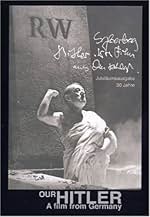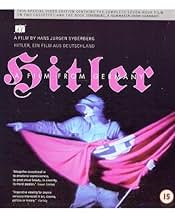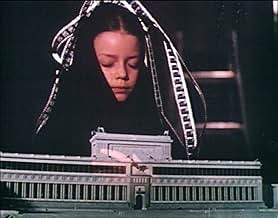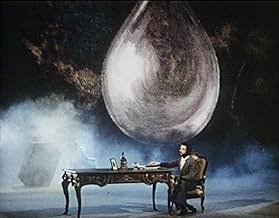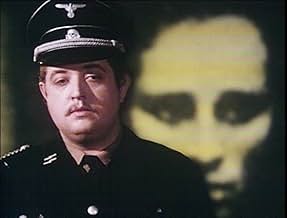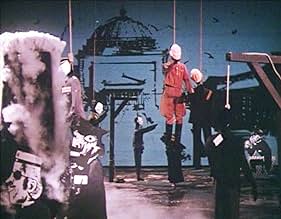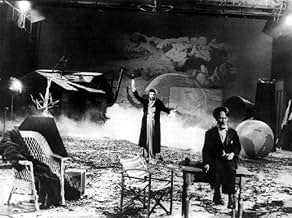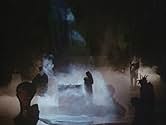Adicionar um enredo no seu idiomaDirector Hans-Jurgen Syberberg examines the rise and fall of the Third Reich in this brooding seven-hour masterpiece, which incorporates puppetry, rear-screen projection, and a Wagnerian sco... Ler tudoDirector Hans-Jurgen Syberberg examines the rise and fall of the Third Reich in this brooding seven-hour masterpiece, which incorporates puppetry, rear-screen projection, and a Wagnerian score into a singular epic vision. Syberberg, who grew up under Nazi tyranny, ruminates on go... Ler tudoDirector Hans-Jurgen Syberberg examines the rise and fall of the Third Reich in this brooding seven-hour masterpiece, which incorporates puppetry, rear-screen projection, and a Wagnerian score into a singular epic vision. Syberberg, who grew up under Nazi tyranny, ruminates on good and evil and the rest of humanity's complicity in the horrors of the holocaust.
- Direção
- Roteirista
- Artistas
- Prêmios
- 2 vitórias no total
Avaliações em destaque
I've seen this film twice in a cinema (Berkeley, CA) when it came around. Obviously people willing to subject themselves to eight hours of surrealist images about Hitler as the Great Communicator (the original for you Reagan fans) are going to go in a bit prejudiced. I had not yet seen any other Syberberg films nor read anything about him or his films, as I wanted to experience this for it's own sake without preconceived notions. After intermission, my friend, a warehouse manager, and I couldn't wait to see the rest. The same was true when it returned a few years later and I saw it with an artist friend, who was even more excited. We heard similar buzz from the people around us at intermission. This movie was something special, and after all these years, having re-read the screenplay and amazed at the images, I'd see it again for an all nighter. But I don't really have to because I can replay most of the scenes in my head at any time -- they were that striking and memorable. I guess part of that may have to do with the fact that I am born German, and was once a student of modern German literature, theater, art and lived in Munich when artists like Handke, Thomas Bernhard, Max Frish, Fassbinder, Herzog, Wenders and Syberberg challenged the status quo and awoke Germans to the idea that there is something else besides Brecht, Grass and sighing the Mea Culpa over the Third Reich.
Syberberg had already done films that were hard to get shown (this was before the Video Revolution) and with Hitler he really went overboard. This film could never be a commercial success, but it was worth the making and seeing. It creates images, meant for someone who is steeped in German mythos while at the same time aware of the changes wrought on world media by Edison's invention of the moving pictures. Combine these with mass communication capability, the capability to entrance the masses with the images they want to identify with is the history of both Hitler and Movies. So for eight hours Syberberg bombards the viewer with images of the Black Mary (Edison's studio) as a backdrop, Hitler rising out of Wagners grave in a Roman toga, Radio tranmissions of SS Troopers singing Silent Night direct from Stalingrad, touching personal reminiscances by Hitler's butler of how he liked his underwear pressed, his projectionist eating a sausage picknick at the old Eagle's Nest talking about what a nice regular guy his old boss was.
In short, this movie fills the viewer with indellible images of the capability of mass media to suck in the viewers, give them a sense of intimacy, and trivialize mass murder from a "real life human perspective." No single scene or sermon or 90 minute expose of Auschwitz can ever hope to drive home the real insanity of the mass delusions which created the greatest tragedy of this century. And for Germans the constant cleansing and coping escapism of the post war era (It wasn't us, it was those few bad guys that are now dead) needed a real response by the generation that was born afterwards. And the only way Syberberg could do that was to let all those images of the collective German memory of the great history of its irrationalism and romanticism fight against the attempt to rationalize it's rape by their own philestines.
Memorable quotes include the famous "Every time I hear the word Art I reach for my pistol."
Particularly good are Andre Heller as the melancholy narrator, the dialog between Himmler and his masseur, Christmas stories, and touching human stories about Hitler and his beloved doggies. Those skits are kind of like a news magazine story about the human side of John Wayne Gacey as Bunel and Dali might have filmed it.
It's something like a fusion of documentary and biographical film, all filmed on a stage (so almost like a play, too), with tons of voiceover - both by actors and through real historical speeches - all of it aiming to unpack who Hitler was, what he did, how he rose to power, how he affected the world, and the implications the existence of such an individual has on the psyche of the world's population. The presentation is strange, sometimes repetitive, surreal, dreamlike, minimalist, and often eerie.
As broad as that sounds, it's also only scratching the surface. It's so dense and filled with so many ideas- some clear, most philosophical, and some presented in a very obscure way. It's the kind of movie you feel like you're drowning in sometimes. But I know it's sort of meant to be this way. It has some degree of power this way, but it renders the film all but impossible to fully digest.
But maybe that's okay. Maybe scratching the surface and still gaining a lot is significant. Maybe anyone brave enough to watch it more than once would have it all made clear.
I don't think I'll ever watch it again. But I don't regret watching/being almost suffocated by it once.
To understand Hitler, to understand Germany, to understand the culture of the German people and their subsequent spiral into the vortex of World War II, this film is a must see.
It's unfortunate that it is not available on DVD (or VHS).
At a running time of over seven hours, the film festival people offered two intermissions during the showing. If you ever get to see this film be prepared for a test of your physical as well as your mental endurance.
Surreal, trance-like fairytale nightmare about the little man who wanted to be the most supreme.
Intelligent doesn't cut it for this masterpiece - it is way beyond that. An abstract, eccentric and caricature-ish depiction of the rise and fall of the madness and sickness that is Hitler.
Seek it out if you can.
Você sabia?
- CuriosidadesFinal part of Hans-Jürgen Syberberg's trilogy on German history, also including Ludwig - Requiem für einen jungfräulichen König (1972) and Karl May (1974).
- ConexõesEdited into Gli ultimi giorni dell'umanità (2022)
Principais escolhas
- How long is Hitler: A Film from Germany?Fornecido pela Alexa
Detalhes
- Data de lançamento
- Países de origem
- Idiomas
- Também conhecido como
- Hitler, Um Filme da Alemanha
- Locações de filme
- Empresas de produção
- Consulte mais créditos da empresa na IMDbPro
Bilheteria
- Orçamento
- DEM 1.000.000 (estimativa)
Contribua para esta página


